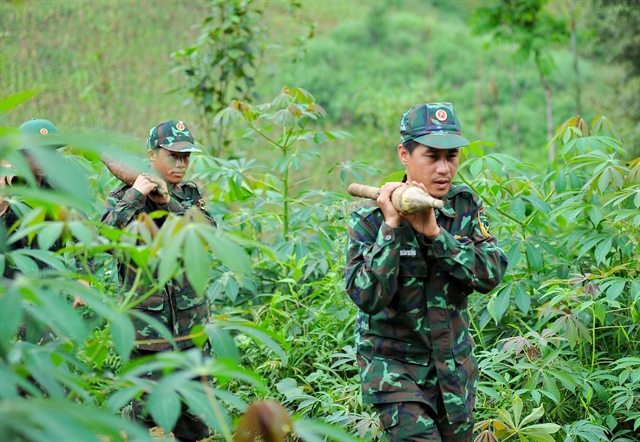 Society
Society

Since March 1, 2023, local authorities have implemented the second phase of the project on demining mines and explosives to serve in the search and gathering of remains of martyrs who died in the Fatherland defence war in Hà Giang province.

|
| Soldiers in Hà Giang Province bring bombs, mines and explosives out of the forest. — VNA/VNS Photo Nam Thái |
HÀ GIANG — Hundreds of officers and soldiers in northern Hà Giang Province battle severe weather and mountainous terrain to clear unexploded ordnance (UXO) and search for the remains of martyrs.
According to the provincial Department of Labour, Invalids and Social Affairs, as of 2020, there were 214 people in the area affected by unexploded bombs, mines and explosives.
Nậm Ngặt Hamlet in Vị Xuyên District is home to dozens of people wounded by UXO left over from the war while walking in the forest or working in the fields.
Many victims have lost legs, arms or eyes or have been wounded by shrapnel. Some have been wounded on multiple separate occasions.
Bồn Văn Hòn, living in Nậm Ngặt Hamlet, lost both legs after stepping on a mine while working the fields.
He went from being the family breadwinner to being unable to work and requiring constant support from his family.
Although he tried to get used to prosthetic legs, Hòn could only help his family with simple tasks like cooking or tending to cattle and poultry.
“I hope the Party and the State will continue to support us. Because the area where we live still has many people affected by landmines, some people have lost their eyes, some have lost their hands, some people have shrapnel stuck in their bodies and have not been able to remove it,” he said.
Since March 1, 2023, local authorities have implemented the second phase of a project on removing mines and explosives and searching for the remains of martyrs who died in the war in Hà Giang province.
The project was managed by the Command of Military Zone 2 and Hà Giang province’s authorities.
Eight units with the participation of 500 officers and soldiers have cleared 1,500 ha of land in Minh Tân Commune, Vị Xuyên District and two communes of Tả Ván and Nghĩa Thuận in Quản Bạ District.
After more than four months, 400 ha of land have been cleared. Tens of thousands of bombs and explosives of all kinds have been safely detected and collected with many types still able to explode. The project is expected to be completed in mid-2026.
Lieutenant Colonel Nguyễn Thành Nam, Site Commander of 319 Bomb, Mine and Explosive Ordnance One Member Ltd Company, said his company has mobilised 200 employees to perform the task.
They encountered many difficulties due to the large area, rugged terrain with lots of high mountains and dense forests. Severe weather conditions with lots of rain and fog also pose risks to soldiers, he said.
All of them have overcome difficulties to ensure safety when detecting, handling and collecting bombs, mines and explosives and then moving them to a safe location, gathering martyrs’ remains and other tasks, he said.
According to Nam, after more than four months, the company has collected over 3,300 bombs, bullets and explosives of various types. The most popular ones are 105 mm artillery shells; mortar rounds with sizes of 60mm, 80mm, 100mm, 120mm; grenades of all kinds and many other types of undetonated mines.
Lieutenant Colonel Trần Huy Thục, head of Engineers Department, Military Command of Hà Giang Province, said “During the 10-year war from 1979 to 1989, our army and the enemy took turns to occupy beneficial high points. Therefore, bomb, mine and explosive detection and clearance is now a difficult task.
“Land contaminated by bombs, mines and explosives in the province covers about 90,000ha,” he said.
Thục said the bomb, mine and explosive clearance project in Hà Giang Province aims to search and gather the martyrs’ remains and clear land, giving ethnic community land lots for farming.
“We set a goal that every person at the border is a ‘living milestone’ protecting it. When people have land to cultivate, stabilise their lives, develop the economy, the border security will be protected,” he said. — VNS




